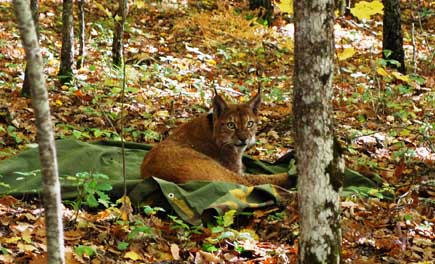
The third musketeer: Like Marko and Riste, Martin was trapped and then released unharmed back into the wild a short time later.
© MES/SCOPES, SNFAll good things come in threes! On 31 October 2012 lynx experts from the Macedonian Ecological Society (MES), one of EuroNatur’s partner organisations, once again succeeded in capturing a Balkan Lynx, to measure it and fit it with a tracking device. ‘Martin’ joins Marko and Riste to become the third lynx to be fitted with a GPS tracking collar as part of the project on ‘The status, ecology and dispersal patterns of the critically endangered Balkan Lynx in Macedonia and Albania’.
The lynx was trapped near Mount Stogovo in western Macedonia, not far from the spot where Riste was captured this March. Just like Riste before him, the young male lynx, aged between three and five years old and weighing in at 25 kilos (a relatively heavy weight), was allowed to disappear back into the Macedonian forest as soon as he had been examined. However, he is under observation; thanks to the GPS radio collar the lynx experts are now receiving regular information about his current location. This allows researchers to follow Martin’s movements in detail and obtain valuable information about the ecology of this critically endangered subspecies of the Eurasian Lynx - information that must be obtained before targeted conservation measures can be put in place.
The Balkan Lynx is one of the rarest cats on earth. Until recently it was not known that there are probably only around 20—40 of these shy animals still living in western Macedonia and eastern Albania. This is half the number that had long been assumed.
In 2006, together with its partner organisations MES, KORA (Co-ordinated Research Projects for the Conservation and Management of Carnivores in Switzerland) and PPNEA (Protection and Preservation of Natural Environment in Albania), EuroNatur set up the ‘Balkan Lynx Recovery Programme’ (BLPR) for the protection of the Balkan Lynx. These field studies into the ecology of the Balkan Lynx are funded by the Swiss National Science Foundation (SNSF) and the Swiss Agency for Development and Co-operation (SDC) as part of the programme for Scientific Co-operation between Eastern Europe and Switzerland (SCOPES).
More about EuroNatur projects to protect the Balkan Lynx


